


New lamps are safer and more energy efficient
By Allan Chen
Scientists at Berkeley Lab's Environmental Energy Technologies Division have developed a safer, more energy-efficient compact fluorescent lamp, or CFL--an alternative to imported halogen torchieres which have caused at least 100 fires and 10 deaths in the U.S., according to the Consumer Product Safety Commission. Staff scientist Michael Siminovitch of the Division's Lighting Group led the team that developed the torchiere fixture.
According to the Lighting Group's calculations, CFL torchieres save money and energy when compared to halogen torchieres. Over the life of the lamp--assumed to be about seven years--CFL torchieres will save $136 and 2,000 kilowatt-hours of electricity, assuming energy costs of 8cents per kilowatt-hour. Halogen torchieres, by comparison, need to be replaced after about one year.
"These new compact fluorescent lamps are not only safer and brighter than halogen lamps, they also will help us save energy and money," said Secretary of Energy Federico F. Peña. "This new lighting technology, developed by Dr. Siminovitch and his team at DOE's Berkeley Lab, will help make our environment safer and cleaner. We are now working with the Environmental Protection Agency to move these new lamps from DOE's lab into America's homes."
Siminovitch and his team have been cooperating with partners in the U.S. lighting industry to turn a prototype design into a manufactured reality within months of conception. A Pennsylvania lighting manufacturer, Emess Inc. of Ellwood City, is already selling torchieres based on this design.
"Imported halogen torchieres use tungsten-based halogen sources in the 300-Watt range," says Siminovitch. "The torchieres have caused one of the largest increases in residential lighting energy use in the United States, consuming more energy than compact fluorescent lamps are saving. They also operate at high temperatures, posing a severe fire hazard. Halogen lamps are essentially heat sources that happen to generate light."
A recent high-profile incident traced to halogen torchieres is the fire that burned jazz musician Lionel Hampton's New York City apartment.
Halogen lamps burn at 1,000deg.F--so hot that you can't hold your hands over them. They heat the ceiling and nearby walls, creating the danger that nearby flammable materials, such as drapes, will catch fire. Compact fluorescents in the Berkeley Lab design produce a wall temperature of only 100deg.F, cool enough to touch without being burned.
When Siminovitch's group first saw reports of the fire hazard and high energy use of these lamps more than two years ago, they began conducting a battery of photometric tests in their lab. Using infrared thermography, they took pictures of the heat output of halogen torchieres on the market. They measured their light output and their three-dimensional distribution in space using a device called "swing-arm goniophotometer" developed at the Lighting Lab. With standard testing devices, the scientists recorded the power, power factor and total harmonic distortion.
"Before discussing this work with manufacturers, we built a number of CFL-based prototypes ourselves," said Lighting Group member Erik Page. The design with the highest light output used two 36-Watt F-type CFLs, but they developed designs using a variety of other CFLs and reflector configurations. (Reflectors are sheets of material, often bowl-shaped, that help diffuse the light from the source.)
Comparing their best design (with the two 36-Watt lamps) to a typical 300-Watt imported halogen torchiere, they found that CFL-based lamps produced 50 percent more light while using one fourth of the energy of the halogen torchiere.
In technical terms, the halogen torchiere consumes 300 Watts and produces a luminous flux of 3,000 lumens, for an efficacy of 10 lumens per Watt. The Berkeley Lab CFL alternative used 67 Watts and had a luminous flux of 4200, for an efficacy of 63 lumens per Watt.
Siminovitch began discussing the problems posed by halogen torchieres at research conferences, attracting interest among manufacturers in developing better alternatives. "Working with innovative manufacturers accelerates the advance of new lighting technologies into the marketplace," says Siminovitch. "Research is only the first step."
Emess Inc. was one of the first manufacturers to approach Berkeley Lab's Lighting Group about developing a CFL-based torchiere product. Within months, the company developed a production model of a CFL torchiere based on the Lighting Group's research. The Group has also advised other manufacturers, and welcomes additional collaborations with the lighting industry. The joint development efforts made headlines this month when Stanford University students began exchanging their old halogen torchieres for the safer alternative in a unique exchange program. (See accompanying story.)
Photo: Berkeley Lab's Michael Siminovitch presents the new, energy-efficient torchiere to Energy Secretary Federico Peña in Washington D.C. Pictured, left to right, are Siminovitch, Michael Dene, president of Emess, Inc., Secretary Peña, and David Frost, energy conservation director of the Stanford Student Housing Office. XBD9706-02661

By Allan Chen
Students at Stanford University received a commercial version of the new Berkeley Lab-designed CFL torchiere during a first-of-its-kind lamp swap held on campus in mid-June. Home-bound students, packing their bags at the end of the academic year, began turning in their old, inefficient and hazardous halogen torchieres at the Governor's Corner dormitories. In return, they will receive a new energy-efficient CFL torchiere from Stanford Student Housing Services when they return in the fall.
At a news event held on June 12, David Frost, head of Student Housing at Stanford, said that one out of four student rooms used the hazardous 300-watt halogen lamps. "Universities across the country have been phasing these out without providing students with an alternative," he said. Stanford dorm rooms had 1350 halogen torchieres before the swap.
University authorities worked with Berkeley Lab's Michael Siminovitch and Emess Lighting to develop a program to swap 500 of these lamps for the new CFL-based models. To replace the remaining torchieres, Stanford will offer the new ones at cost.
As local television news crews filmed, groups of Stanford students arrived every few minutes, carrying their old lamps along an outdoor pathway lined with discarded upright halogen torchieres. After giving their names to Student Housing representatives, they hauled their old lamps over to a recycling bin, tossing the old fixtures in like javelins.
Secretary of Energy Federico Peña made an electronic appearance at the press event via a recorded video greeting in which he was shown with Siminovitch, Frost and Emess president Michael Dene. Peña thanked Berkeley Lab for its role in developing the prototype, Emess for being the first to manufacture it, and Stanford for being the first to provide students with a safer, energy-efficient alternative to halogen torchieres. "I can assure you that President Clinton, now a Stanford dad, thanks you as well," he said.
Photo: XBD9706-02580



Energy Secretary Federico Peña ordered a sitewide safety stand-down at Brookhaven National Laboratory after a contract employee was killed in an industrial accident. DOE officials said the worker was struck by a payloader at a laboratory construction site. Peña ordered an immediate halt to all nonessential operations at the lab and mandated safety training for all site employees. He also dispatched Energy Research director Martha Krebs to BNL to oversee the safety training, and directed Assistant Secretary for Environment, Safety and Health Tara O'Toole to conduct a "Type A" accident investigation into the fatality.
"Last month, I announced the termination of the existing management contract at BNL," Peña said. "I sent a message to the leadership of the laboratory that there will not be a trade-off between scientific research and environment, safety and health. Today, I am sending the same message to all employees. We share responsibility for safety. We must change the way we do our work."
The House Science Committee has asked the General Accounting Office to investigate the Energy Secretary's decision to terminate the contract with Associate Universities Inc. to operate BNL, as well as the environmental problems and other circumstances that led to his action.
Funding for DOE's energy efficiency R&D program would rise to nearly $637 million in FY-98--an increase of $67 million over the current level--under a spending bill approved by the House Appropriations subcommittee on Interior and related agencies. Much of the increase--roughly $45 million--is due to the Subcommittee's decision to shift funding for DOE's advanced turbine development program from the Fossil Energy division to the Energy Efficiency and Renewable Energy division.
Elizabeth "Betsy" Moler was finally sworn in as Deputy Secretary of Energy, and President Clinton named James Hoecker to replace her as chairperson of the Federal Energy Regulatory Commission.
Walter Massey, former UC senior vice president and current president of Morehouse College, is expected to be named chairman of the Secretary of Energy Advisory Board. One of his first tasks will be to assess the status of national user facilities in the next 15 to 20 years. The review, which will be completed by spring 1998, would consider the construction of new facilities and the upgrading, consolidation or closing of existing ones.

Photo: Berkeley Lab's coed ultimate frisbee team, Seaborgium, finished with the third best record at Hewlett Packard's corporate league tournament. The team beat teams from Hewlett-Packard, Sun Microsystems, and Chevron Oil before losing to the eventual tournament champion, a club team from Sonoma. Glenn Seaborg, Berkeley Lab's associate director-at-large, joined members of the team for a group photo. Pictured left to right, are: back row--Fred Bauman, Dariush Arasteh, Bart Davis, Glenn Seaborg, Erik Page, Terry Ligocki; front row--Jeff King, Deb Hopkins, Angela Merrill, CeeCee Fairley, Bill Golove, and Joe Eto. Berkeley Lab participants not pictured include Phil Price, Tim Culler and Steph Robertson. For information about participating in the frisbee team, contact Joe Eto by e-mail at [email protected]. XBD9706-02634

* * *
Glenn Seaborg, Berkeley Lab's associate-director-at-large, was named one of the "Legends of the Upper Peninsula" of Michigan in a May 27 ceremony at Northern Michigan University. Seaborg hails from the small town of Ishpeming, on the upper Michigan peninsula. The town is currently working with the university to establish a museum in Seaborg's childhood home in Ishpeming. A few days later, Seaborg received an honorary doctorate from Waterloo University in Toronto, Canada.
Photo: Ed Lofgren. XBD9706-02584

Researchers systemwide who have completed studies of special relevance to a California policy audience are invited to submit manuscripts summarizing their work for possible publication as a California Policy Seminar (CPS) Brief.
Established in 1977 by the University of California, the CPS applies the research expertise of the UC system to the analysis, development and implementation of state policy.
CPS commissions policy-relevant research on statewide issues, provides technical assistance to policy makers, and disseminates UC research findings and recommendations through publications and special briefings. Offering technical assistance to legislators and executive branch officials, CPS identifies academic experts, convenes meetings and task forces, and commissions data analyses and policy papers on many policy topics. CPS also awards policy research grants to UC faculty and research staff for studies on significant state issues.
Research findings--published as CPS Briefs and reports--are distributed to state officials and policy analysts, journalists, the California congressional delegation, and other interested parties, and disseminated on the CPS website and in special briefings. Research and technical assistance projects have addressed numerous policy areas, including agriculture and water resources, economic development and new technologies, education, employment, energy and utilities, environmental regulation, governance, finance, health, housing and land use planning, demographic change, natural resources, social services, and transportation.
In addition to publishing the results of commissioned studies, CPS also features the relevant policy work of researchers sponsored by other sources in the CPS Brief series.
Manuscripts (not to exceed 2,000 words) should state the research questions and the reasons for posing them (i.e., the context), briefly describe research methods and analysis, and summarize the findings and their policy implications. Where appropriate, they should also describe policy options to be considered.
Questions about CPS activities, sponsored research, and publication opportunities should be directed to 642-5514. Information is available on the web at http://www.ucop.edu/cps.

By Monica Friedlander
This is the first in a series of articles on commuting. Watch for "Biking to Work" in an upcoming issue of Currents.
Tom Trippe started walking at his doctor's urging. His back condition had gotten so bad two years ago that long walks became his prescription back to health. "Walking has been a life savior for me," said the high energy physicist, who now walks to the Lab almost daily. "But since then it has become an enjoyable habit, especially since Berkeley and the campus are such nice areas."
Jan de Vries, on the other hand, needed no outside prodding to hike through the Berkeley Hills and the nature trails that wind their way to Berkeley Lab. Walking has been a life-long hobby for de Vries, an electrical engineer who works for the Advanced Light Source. Yet until just last year it never occurred to him that the somewhat daunting stretch from his home near Kensington to Berkeley Lab could actually be considered "walking distance."
"I used to bike for 20 years before I worked here," de Vries said. "But I didn't enjoy it. I like the freedom of walking, but I never walked to the Lab before because of a psychological block."
Once he got going, however, the 45 to 50 minute walk turned into a highly enjoyable experience for de Vries, who walks up to the Lab once or twice a week. "It's total relaxation," he said. "The climate is perfect, the views and sunsets are great. What more can you ask for?"
Unfortunately, not everyone has the option to hike through the hills and watch the sun filter through the trees while "commuting" to and from work. An estimated three-fourths of Lab employees reside outside Berkeley city limits, which rules out walking as a plausible means of commuting for all but the most adventurous types. But the lucky few who do live within walking distance have a variety of options open to them. For example, hikers do not need to use the main Lab gates to get to work, but may instead use any of the several pedestrian gates that link the Berkeley Hills to Lab trails.
"We strive to make all options equally attractive as driving to work," said Rich McClure of the Lab's Facilities Department. "We want to be responsive to small groups of individuals."
The pedestrian gates are locked, but card keys may be obtained from the Badge Office in Bldg. 65. Mechanical keys must be ordered from the Lock Shop. Supervisor's approval is needed for either key.
The more popular gates include the "HILAC Gate" behind Building 71, which connects to Campus Drive, and the newest "La Verada" gate at the end of La Verada Road by Blackberry Canyon.
"No matter where you live in terms of elevation in North Berkeley," McClure says, "the area has easy access to the Lab."
The issue of elevation is of particular interest to de Vries, who for all his passion for walking, does not particularly care to huff and puff his way up and down steep hills. He would rather enjoy his commute at a leisurely pace, so he went to the trouble of scouting a route that keeps him on level plane.
It all started when de Vries realized that the Bevatron and his home were at same altitude (about 600 feet above sea level). Unfortunately for him, the best known routes to the Lab (leading up to the HILAC gate) forced him to walk up to 900 feet and then come down again. "I can do this better," he thought to himself. So he pulled out a topographic chart and mapped out a walking path that keeps him level. The route takes him along narrow lanes and pedestrian walkways as much as along larger thoroughfares like Spruce and Euclid. His walk starts along Santa Barbara Street and continues through Spruce, Arch, Oakstreet, Oakstreet Walk, Euclid, Rose Walk, Rose Street, Glenwood Terrace, Benvenue, La Loma, and finally La Verada.
Tom Trippe, who walks to work almost every day and swims on campus twice a week, is less concerned with walking as a leisurely activity. He wants to keep his aching back in shape. "Walking is one of the best exercises," he said. "It can also be an aerobic exercise if you push it coming up the hill."
Finally, walking does not have to be wasted time for those of us who never find enough hours in the day. As Trippe demonstrates, walking to work can be turned into a time of personal enrichment.
"I carry cassettes and practice my Spanish," he said, and then added with a chuckle, "even if people think I'm crazy walking around babbling to myself."
Photo: Jan de Vries. XBD9706-02577-02

Congratulations to the following employees who celebrated anniversaries of service with the Laboratory between January and June 1997.
David T. Attwood, Materials Sciences
James C. Bartholomew, Structural Biology
Richard A. Gough, AFRD
Joy N. Kono, AFRD
Ann E. Lawhead, Materials Sciences
Frank R. McLarnon, EET
Charles P. McParland, Computing Sciences
Joe L. Moore, Computing Sciences
Jose A. Olivares, Computing Sciences
Maria T. Ossa, EET
Mona R. Purifoy, EET
Alice S. Ramirez, Computing Sciences
Jayant A. Sathaye, EET
Glenn M. Skipper, Engineering

By Denise Rogers, Student Intern
Berkeley Lab employees have the opportunity to further their education at the University of California at Berkeley or at any other accredited school for a reduced cost, as long as they continue to work at the Lab. Three programs are available for them.
Berkeley Lab's Employee Tuition Reimbursement Program
The Tuition Reimbursement program, which has been in existence at the Lab for decades, financially assists Lab career employees in acquiring new skills and knowledge that will increase their present work performance and improve their future career opportunities at the Lab.
Career employees who work at least 50 percent time at the Lab are eligible to take college level classes for career or job-related purposes or to pursue a degree. Visiting guests or foreign visitors are not eligible.
"We presently have 67 employees going through the reimbursement program," said Christa Brothers, program coordinator for Employee Development and Training. "All the national laboratories have reimbursement programs. We think it is because they want to be competitive with private industry."
The Lab will pay two-thirds the cost of tuition and the employee will be responsible for one third. To be reimbursed, you must complete the course with a letter grade--"C" or better for undergraduate work and "B" or better for graduate work. Continuing Education Units (CEU) do not qualify for tuition reimbursement, but courses offered through the UC Berkeley extension are covered.
To be eligible for the Tuition Reimbursement Program, you must be a California resident and not receive financial aid other than veterans benefits or the UC Reduced Fee benefit. (See next item.)
Employees may choose any accredited college or university as long as the coursework relates to their present career at the Lab or to one they are likely to pursue in the future.
To qualify, you must:
"The benefit of this program is that people can go to school and apply what they have learned in the classroom to their current job at the Lab or a future job," said Brothers.
For questions or information about the program, contact your supervisor or division director, or call the Employee Development and Training Unit (X5999) or Christa Brothers (X4238).
UC Fee Reduction Program
The UC Fee Reduction Program reduces tuition fees by two-thirds for full-time, permanent Lab employees who are fully enrolled at any of the UC campuses. This program can be combined with the Lab's Tuition Reimbursement program, so the employee only pays one ninth of the tuition fee.
Unlike the Lab's Tuition Reimbursement Program, the UC Fee Reduction Program does not cover extension programs. For more information about the program, contact Christa Brothers at X4238.
UC Berkeley Extension
Taking courses through the UC Berkeley Extension program is convenient for Lab employees due to class location. Cal's Extension program offers nearly 1,900 courses each year--everything from evening classes to one-day seminars and weekend conferences.
The Extension programs offers 23 multi-course certificate programs in many different fields. They are designed for people who want to gain background in a certain field but do not necessarily want to pursue a degree. English language classes are also offered either full or part-time to non-native speakers.
Extension courses are offered around the Bay Area--Berkeley, San Francisco, Menlo Park, Atherton, Fremont, Walnut Creek and San Ramon--and can be eligible for tuition reimbursement.
For more information, write to University of California Extension, 2223 Fulton Street #7000, Berkeley, CA 94720-7000, or call 642-4111.
In that case the course is considered off-site training. Your division pays all costs for the class, including books, travel and expenses. You are responsible for your share of the cost for any other classes you may take that are not required.
Can I take time off with pay to attend the class?
Yes, provided:
Only on graduate courses. The reimbursement will appear on your W-2 form as income.
What happens if I withdraw from class before its completion and my fees cannot be reimbursed?
If you are required to drop the class due to a work assignment, your course fees will be reimbursed. The Lab will not reimburse for withdrawal due to personal reasons.

Berkeley Lab receives ROI funding
DOE has funded the following six new Return on Investment (ROI) projects, all designed to reduce waste generation at Berkeley Lab:
Dry Waste Disposal Procedures Are Described in New Pamphlet and Sticker
A new pamphlet is available from your generator assistance specialist to help explain the requirements for dry waste management. Results of recent investigations of the Lab's dry waste indicate that much of the dry waste that Waste Management accepts from generators contains items that are not allowable, such as lead, mercury and liquids. When dry waste contains these items, non-standard treatment and disposal options must be applied.
Dry waste is commonplace in research laboratories that use radioisotopes. It consists of common laboratory items, such as gloves, wipers, plastic, or glass, which may have some radioactive contamination. Dry waste is typically accumulated in two-cubic-foot bags. When the bags are picked up and prepared for storage, their contents cannot be easily identified without someone having to open the bags and sort through the waste, a practice Waste Management generally wants to avoid. One of the reasons is that there may be sharp items in these bags which could pose a serious risk of injury. Please be sure to place radioactive sharps in a sturdy, rigid, sealed container prior to placing this type of waste in a dry waste barrel.
Waste Management has developed a dry waste sticker that can be placed on your waste collection container to remind users of prohibited items. Please contact your generator assistance specialist to get the stickers.

By Denise Rogers, Student Intern
Two hundred and fifty-one high-school students were honored with the Mike Nitschke Award trophy and words of praise from Berkeley Lab's Glenn Seaborg and Al Ghiorso at the first Bay Area-wide California Invitational Chemathon awards held here on June 11.
"This is the first time that we had all the schools get together to collect their awards at a ceremony," said Berkeley Lab physicist Howard Matis. "Usually it was done individually at the schools."
The Chemathon is a high-school science competition that receives support from the Lab and other institutions. Held in the spring at a local high school, the competition offers students the opportunity to spend a day examining science exhibits, watching presentations from Lab scientists and competing in tests throughout the day. "The Lab is involved in the Chemathon by hosting nuclear physics exhibits all day along," said Matis. "The students take a series of tests throughout the day and at the end the scores are tallied to determine the winners."
The ceremony was sponsored by the Nuclear Sciences Division (NSD) and the awards were funded by the J.M. Nitschke Memorial Fund. Nitschke was a theoretical and experimental physicist who died in 1995 and left his estate to science education, which he firmly believed and participated in. "Although Mike wasn't directly involved in the Chemathon, he spent a lot of time mentoring students, and would have students work for him," said Matis. "He was a very good teacher."
NSD physicist Al Ghiorso, who was appointed executor of Nitschke's estate, presented a "tribute to the memory of Michael Nitschke" and spoke of what a great scientist he was. "He was wonderful with students because he gave them a taste for real science and would make them understand," he said.
As executor of Nitschke's estate, Ghiorso decided to make his legacy live on by setting up an endowment fund that would be used for science education.
"I think the Chemathon is a good place to give some money out, and I am pleased we can afford to use some of the funds for you," Ghiorso told the students.
Nobel Laureate Glenn Seaborg, the Lab's associate director-at-large, spoke about discovering the transuranium elements, and how he moved some elements around on the periodic table. "I had a great deal of difficulty convincing people that was the right way, but now it is universally accepted," Seaborg said. "And for that I received a Nobel award for chemistry--shows you how easy it is to get a Nobel award."
Participating scientists were delighted that the ceremony was held at the Lab. "I have always wanted better recognition for the Chemathon people, and to show the Lab's support," Matis said. "The schools always had to buy their trophies with their own money, but this time we were able to buy the trophies for them. The schools can save their money to go towards more science education."
The trophies were handed out to eight Bay Area high schools: Chinese Christian, Mission San Jose, Salinas, Albany, Andrew Hill, Piedmont, Irvington and American. For the second year in a row, the Chemathon was hosted by Kennedy High School, which will host it again next year.
The awards were divided into seven divisions: college-prep chemistry, applied chemistry (integrated science), AP/honors chemistry, honors chemistry, college-prep biology, AP/honors biology, and physics.
Eric Persoff, son of Peter Persoff, staff scientist in the Earth Sciences Division, received a third place trophy in honors chemistry from Albany High School.
"We have all the sciences covered," said project director Peggy Carlock, a former teacher at Albany High School.
Photo: Students from Albany High School show off the Mike Nitschke trophies they received for winning the California Invitational Chemathon. XBD9706-02531-15
Photo: Piedmont High School student Caleb Auyoung presents Glenn Seaborg and Al Ghiorso with the official 1997 Chemathon T-shirt. Auyoung won the statewide art competition for the T-shirt design. XBD9706-02531-10

The Employee Activities Association has issued a call for nominations to fill positions that are coming open on its advisory panel. The positions are open to all career Lab employees.
The EAA supports activities such as the Berkeley Lab Runaround and the annual Employee Picnic. It also supports the Lab's recreation groups, including Toastmasters, Arts Council, Golf, Soccer, Outdoor, Bowling, Volleyball, and Softball.
EAA also supports the Lab's cultural groups, which include:
The responsibilities of the advisory panel are to advise management and the activities coordinator about EAA's activities, monitor the distribution of funds from the Employee Relations account to benefit the largest number of employees, monitor the activities of the EAA, provide long-term planning, and recommend new programs and activities. The current activities coordinator is Jane Baynes.
The panel has two positions open--one representing the recreational group and one representing the cultural group--that will be filled through a self-nominated labwide election in July. If you are interested in nominating yourself for either position, fill out, clip and return the attached nomination form to Jane Baynes (M.S. 65A-109; fax 4072) by Friday, July 11. Of the two representatives elected, the one receiving the greater number of votes will serve a three-year term. The other representative will serve a two-year term.
Watch Currents for election information.
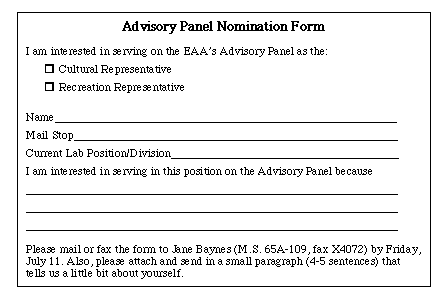


The EH&S Division has developed an Ergonomics website as a tool for helping employees create a more ergonomic worksite. The site provides information about how to get your worksite evaluated, as well as a list of resources and links to other ergonomic websites. You can visit the site at http://www-ehs.lbl.gov/ergo/index.htm.
In addition, the Laboratory will hold its annual Ergonomics Fair in Perseverance Hall (Bldg. 54 addition) from 11:30 a.m. to 1 p.m., July 28-30. Ergonomic furniture, tools and accessories will be on display, and vendors will be present to demonstrate their products and answer questions. For more information, contact Larry McLouth at X5286.

The Library's recently updated journals list on the web (http://www-library.lbl.gov/Library/text/ftext/ejour.html) allows you to quickly locate both paper and electronic journals. If you do not find the journal you are looking for, try searching the UnCover database with its new, easy to use web interface. UnCover is an online article delivery service, a table of contents database, and a keyword index to nearly 17,000 periodicals. You may order articles from journals the Berkeley Lab Library does not own and have them delivered to your fax machine. More information on this service is available at http://www-library.lbl.gov/Library/text/db/uncover.html on the web.

Berkeley Lab's Library is offering the following 20-to-30 minute small group-training sessions:
Please contact Jhane Beck (X4622) to reserve a space in these sessions.
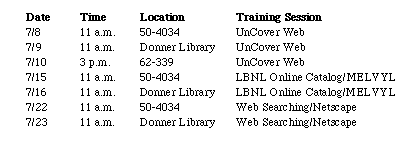

The June 23 edition of Headlines listed an incorrect prefix for the Technical and Electronic Information Department's new phone number. The correct number is 495-2787 (or 495-ARTS). The extension announced in Headlines (2787) is correct. TEID has recently instituted a new procedure whereby all requests for services--editorial, illustration, and/or web-related--go through a central intake center. When you call the number listed above, you will be directed to the appropriate person to handle your project.

Security Manager Don Bell would like to remind everyone that beginning on July 1, you can expect to see Burns Security officers making routine checks in their buildings during the day, night and on weekends. These security checks will be made for the safety and security of all Lab staff. Other services provided by Burns Security will include guide services for visitors and the presence of two security officers at the main (Blackberry) gate during peak traffic hours
(6:30 a.m. to 10 a.m.).

The following Oracle Channel courses will be held from 8:45 a.m. to 1 p.m. in Bldg. 936-12. Registration deadlines are the Monday prior to the week the class is to be held.
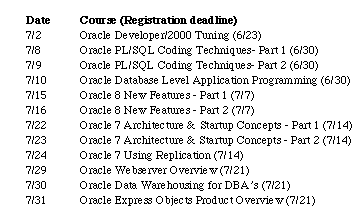
To register for a class, send an e-mail to [email protected] or call X5999. Course participants are advised to arrive to class on time. For information about class content, see http://www.lbl.gov/Workplace/EDT/computers/oracle.html.
The following on-site computer courses for Windows are taught from 9 a.m. to 4 p.m. in the Bldg. 51L computer room. The cost is $100 for each of these one-day courses (except for Windows 95 Transition and Windows 95 Fundamentals, which are free).
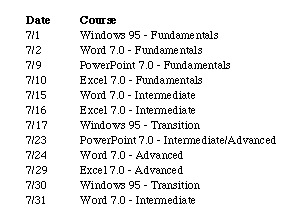
Following is the June schedule for free three-hour courses covering the basics of cc:Mail and Meeting Maker:

To enroll, complete an AIM enrollment form ((http://www.lbl.gov/Workplace/EDT/computers/PC_Classes.html), obtain your supervisor's approval, and fax it to 827-1614. You will receive a confirmation call within two business days. Cancellation policy: Your division account will be charged for onsite computer classes that have a fee unless you cancel five working days prior to the scheduled class.
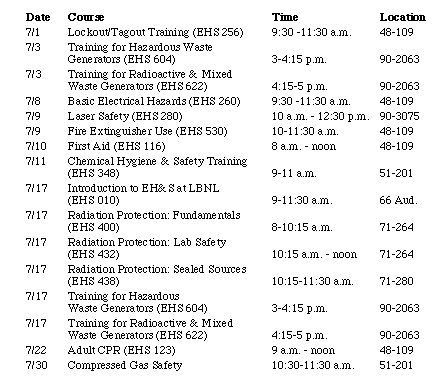
*Pre-registration is required for all courses except Introduction to EH&S. To pre-register, send e-mail to [email protected]; fax to X4072 with your name, employee ID number, extension, and class name, date & code; or call X5999.
Noon-1 p.m. in Bldg. 90-4133.
Noon-1 p.m. in Bldg. 90-4133.
Noon-1 p.m. in Bldg. 90-4133.
General meeting at noon in the lower cafeteria.
Toastmasters'
General meeting at 12:10 p.m. in Bldg. 2-100.
7:30 a.m.-4:30 p.m., Bldg. 54 parking lot.
African American Employees Association
General meeting at noon in Bldg. 90-1099.
BodyWorks Aerobics Class
Noon-1 p.m. in Bldg. 90-4133.

"The Magnetism of Fe on Cu(100): The X-Ray Magnetic Circular Dichroism Point of View" will be presented by Jonathan Hunter Dunn of Uppsala University, Sweden, at 1:30 p.m. in the Bldg. 66 auditorium.
Physics Division Research Progress Meeting
"Rare and Forbidden Tau Lepton Decays in CLEO II" will be presented by Igor Volobouev of the Southern Methodist University at 4 p.m. in Bldg. 50B-4205; refreshments, 3:40 p.m.
"Studies of Tau Decays into 3h+/-ut and 3h+/-hut Final States" will be presented by Vasilii Shelkov of the Southern Methodist University at 4 p.m. in Bldg. 50A-5132; refreshments, 3:40 p.m.
"The Transition to a Sustainable Energy Supply" will be presented by Steve Fetter of the University of Maryland at noon in Bldg. 90-3148.
"International Projects to Mitigate Greenhouse Gas Emissions: An Asian Gas Center" will be presented by Steve Torok of the UNESCO Asian Gas Center at noon in Bldg. 90-3148.
Surface Science and Catalysis Science Seminar
"VOC Combustion and NOx Decomposition: Mechanistic Studies" will be presented by Laszlo Guczi of Institute of Isotopes, Hungarian Academy of Sciences, at 1:30 p.m. in the Bldg. 66 auditorium.
Physics Division Research Progress Meeting
"Muon Colliders: Status and Prospects" will be presented by Steve Geer of Fermilanb at 4 p.m. in Bldg. 50A-5132; refreshments, 3:40 p.m.
"High Gradient, High Energy Acceleration in a Plasma-Loaded Wiggler Pumped by RF" will be presented by Rodolfo Bonifacio of the University of Milan at 10:30 a.m. in the Bldg. 71 conference room.
Items for the calendars may be sent via e-mail to [email protected], faxed to X6641 or mailed to Bldg. 65B. The deadline for the July 11 issue is 5 p.m. Monday, July 7.

The Berkeley Lab Golf Club played its June 21 tournament at the San Ramon Royal Vista Golf Course. Results are as follows:
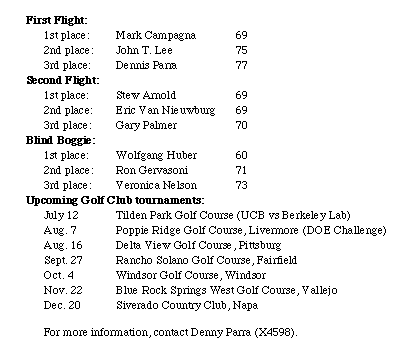
UC Berkeley's FIT program offers year-round tennis activities that are open to Lab employees. Adults of all ages and skill levels may participate in summer classes (new session starts June 28), a singles tennis ladder, a doubles tournament (June 28), or private lessons. Call 643-5151 for more information or to register.
The 1997 season of the Berkeley Lab Softball League has begun. Scores from the third week and standings are listed below. Games are played Wednesdays at Kleeburger Field on campus. For more information, contact Steve Blair at X5927.
Results of June 25
Camshafts, 25
Drosoftballa, 2
Rated X, 16
Ball Park Estimates, 5
Low Gear, 9
Sudz, 6
Environmets, 30
Las Chupacabras, 3
Da Rebels, 24
Animals, 2
Standings as of June 26
Camshafts, 3-0
Environmets, 3-0
Low Gear, 2-1
Rated X, 2-1
Sudz, 2-1
Ball Park Estimates, 1-2
Da Rebels, 1-2
Animals, 1-2
Drosoftballa, 0-3
Las Chupacabras, 0-3

'73 BMW 2002tii, rare, silver, alloys, SR, new tires, runs well, $4K/b.o. Andy, X5992, 665-1442
'86 MAZDA 323, 4-dr sedan, 5-spd, a/c needs recharge, $1350/b.o. X7729, 799-7041
'87 CHEVETTE, 4-dr hatchbk, a/t, a/c, low mi., $3250/b.o. X7729, 799-7041
'87 DODGE Caravan SE, 75K mi., great cond., V6-3.0 liter engine, a/c, a/t, privacy glass, cruise control, radio/cass., luggage rack, must sell (back to Europe in July), $6K. Thorsten or Kirsten, X7962, 524-6687
'88 HYUNDAI Excel, 4-dr, manual trans., rebuilt eng., $2200. X5205
'90 HYUNDAI Excel, 80K mi., new tires & brakes, $2500/b.o. 689-5744 (eve)
'91 MAZDA pick-up LE X-Cab, red, w/cass. player & bed liner, great cond., $6900. Paul or Gary, 527-9447
'92 INFINITI G20, 77K mi., a/t, a/c, cruise, stereo, warranty 10 mo. left, exc. cond., asking $9500. Shigemi, X5152, 376-3190
CAMPER VAN, pop-top, '93 Ford E250, self-contained, slps 4, a/c, AM/FM cass., exc. cond., $23K. Don, 233-5846
WHEELS & TIRES, 4 Al Mag wheels w/BF Goodrich tires 245-50R14, 75% tread, $450/b.o. Stephen, 428-3641, 527-8210
HOUSE TO SIT, this summer, all or part, anywhere in Bay Area, exc. plant & pet care, refs. avail. Amy, 843-5433
NIGHT ATTENDANT for Owen Chamberlain who has Parkinson's disease, responsible, caring, night "presence", light duties, in exchange for rm w/bay view, Oakland Hills, extras negot., CDL, refs. 524-4654
VCR, used, record function not necessary. Colleen, X6372
VOLUNTEERS to be counselors-in-training for summer science campbased at Berkeley Lab, camp runs 7/21 thru 8/29, volunteers may sign up for one or more wks, but must be able to participate full-time, prefer that volunteers have some experience working with children & are at least 15 yr. old. X6566
WASHING MACHINES (4), working, donations to The Boy Scouts of America (Camp Herms in EC). Dan, 799-0818
BIKE, Bridgestone XO-5 hybrid, 20" frame, 21-spd, black, exc. cond., ridden less than 100 mi., $325 new, $170. Rich, X5710
COLOR TV, Toshiba, 13", w/remote control, exc. cond., $125/b.o. Chris, X4476
COMPUTER, 2 gigabyte Maxtor hard drive, brand new, never used, $175. Deane, X5063, 549-0914
FIREPLACE MANTLE, 1940s, made of vertical grain fir stained dark walnut, 72"W x 50"H x 10"D, w/an opening 50-1/2"W x 36"H, $500. Kelcey, X4879
FUTON + frame, queen sz., exc. cond. (1 yr.), $150/b.o. Nik, X7802, 658-7807
GARAGE SALE, Sat. & Sun., 6/28 & 29, 8 a.m.-5 p.m., 856 Mariners Pointe, Rodeo (turn from Willow Ave.), clothes, toys, jewelry, gas trimmer, toolbox, bikes, speakers, vacuum cleaner, carpet shampooer, CD player, CD stand, coffee table & more.
GUITAR, Guild D/25, cherry finish, exc. cond., w/case, $500/b.o. David, X7326
HOME WATER DISTILLER, stainless steel, 4 liter cap., $50. Carol, X4812
MEMORY, 8MB of Apple Macintosh memory, 168 PIN DINN (for PowerMacs such as the 6400), $25. Howard, X5031, 540-6718
MOVING SALE, new Sunbeam intermediate mixer, 10-spd, sits on base, self-rotating, incl. bread blades & bowl, $79.99, asking $32.50; toaster, used, exc. cond., $6; Interplak elec. toothbrush, exc. cond., $17.50. Reney, 653-6964
MOVING SALE, dining table w/4 chairs, white wood, $120; lg. wood desk w/both side drwrs, $100; queen sz. bed, box & mattress, frame, $150; bookshelf, $20; computer desk, $20; microwave oven, Sanyu, $80; Sony Beta Hi-fi VCR, $120; 4 wood picnic chairs, $20; lamps, $15 & $5; PC computer, 486 DX2 66MHz, 16MB RAM, 1GB hard drive, 17" color monitor, CD drive, modem, $900. Sasaki, X5152 (`til 6/30). 376-3190
MUSIC SYSTEM, Panasonic, nr new, for use on European Continent, reasonable. 524-4654
NOTEBOOK, Everex Tempo Carrier, 386SX w/Math Co-Processor, 8MB RAM, 5.5 lb., carrying case, 3.5" floppy drive, built-in modem, manuals, runs Windows 3.1, $250. Christine, X4635
QUICKEN 7 for Macintosh, still in shrink-wrap, on-line banking, budgets, investment mgr., etc. $20. Ed, 339-3505
SAILBOAT, Cal 20, 6HP Chrysler outboard, berthed Berkeley Marina, B-22, $950. Dave, X4024, 526-0552 (eve.)
SEA KAYAK, Mariner Coaster w/accessories, $1500. Marty, 521-4829
SEGA GENESIS + Sega CD system, 12 games & 2 controllers, $150. X5521
SKI BOOTS, Raichle, man's sz. 10-1/2, $25; speakers, BSR 3-way, approx. 3 ft. tall, $65/pair. Debbey, X6430, 527-8210
TRUNDLE BED w/mattress, white metal frame, $75. Tom, X4672, 283-0576
TV CABINET, Mobilia, 30W-17D-20H, 3 drwrs for 30 VHS cass., on heavy-duty casters, oak & smoked glass doors, $125; audio cabinet, Kenwood, 21W-16D-46H, oak color w/4 black shelves, $35. Bill, X7735, 932-8252
WASHER & DRYER, Whirlpool, $75/ea.; futon, $30; desk, $50; stereo, $150, moving sale, more stuff. Thorsten, X7962, 524-6687
WINDSURF STUFF, Minstral Stinger board, board bag & fins, $1111; Wadell sails, sz. 3.7, 4.3, 4.7, 5.3 & 5.9, $650 for all. 381-9814
BERKELEY, Northside, unfurn. studio apt in house, pvt entrance, bathrm & sm. kitchen, wooded setting w/bay view, avail. 7/1, $575/mo., utils incl. 704-0609 (eve.)
BERKELEY, Carleton/Grant, nr BART, Berkeley Bowl, 10 min. drive to LBNL, newly renovated, 2-bdrm apt, ground flr of 2-story Victorian house, sunny, front garden, washer/dryer, custom tile flrs, no smoking, no pets, avail. 8/1, $1150/mo. incl. part. utils. Richard, X6320
NO. BERKELEY, lg. furn. Victorian 1-bdrm, 1-bth apt, linens, kitchenware, laundry fac., sec., encl. garden, dbl carport, term lease only, avail. 8/8, short ter OK, walk to UCB, LBNL shuttle, BART & shopping. 848-1830
EMERYVILLE, 1 bdrm avail. in furn. 2-bdrm duplex, short-term, July-Aug., 5 min. from Berkeley, BART & bridge, hardwd flrs, dishwasher, on-st. parking, storage avail., prefer female, non-smoker, no pets, $375/mo. + utils. 652-6434
WANTED: sm. house in gd No. Berkeley, Albany or close-in El Cerrito area for visiting senior scientist & wife from Israel, July '97 thru March '98. Al, X5301, [email protected]
WANTED: 2-3 bdrm house/apt for UCB grad student & family, beginning in Aug., prefer family-friendly location nr park, grocery, public transit. Rebecca or Patrick, (206) 528-0977, [email protected]
WANTED: visiting British physicist w/wife desperately seeking self-contained, furn. accommodations for 7/8 til 9/8, min. 1-bdrm, living rm, bathrm, w/cooking fac., in Berkeley, or accessible by BART, prefer both, up to $1400/mo. depending what is in offer. Barbara, X5831, David Lyth, 44-1524-844037 (fax), [email protected]
WANTED: Visiting scientist at the ALS seeks short term housing (7/26 - 8/12). +49 6221 516 326, +49 6221 516-540 (fax), [email protected]
WANTED: visiting professor & his family seek furn. apt for the entire mo. of Aug. Manuel or Barbara, 527-0640
WANTED: long term rental of 2-3 bdrm house/apt in Berkeley or surrounding area for LBNL postdoc & spouse starting anywhere between 7/15-9/1, no smoking, no kids. Karen or Clem, (801) 581-4793 (work), (801) 463-6796 (home), [email protected]
WANTED: housing for French scientist visiting LBNL, single rm from 6/25-7/31 and then a house for himself, wife & 2 children (8 & 11) from 8/1-28, possibility of exchange with our 3-bdrm townhouse w/garden in Bordeaux for the month of August, we are 40 min. from Atlantic coast & 2 hr. from the Spanish border, no pets, 2 cars avail., we both smoke 2-3 cigarettes a day - but not in the house. [email protected]
WANTED: rm w/double bed or sm. apt for 2, w/kitchen, for Italian visiting scientist, in the Berkeley area, from 8/13 - 9/15, not necessarily within walking distance from the lab, rent around $800 or below. Gautier, 495-2983, [email protected], Marcella, X6304
WANTED: furn. 1 bdrm in apt/house in LBNL area for female visiting researcher from Germany, shared housing OK, arriving 7/20, for 2 yr. postdoc position. [email protected]
WANTED: unfurn. lg. studio or 1 bdrm in house, for LBNL employee. Steve, X6966
WANTED: 3-bdrm house in No. Berkeley, Lab family w/mature children, no pets, long-term rental. Carol, X4812, [email protected]
WANTED: furn. house for the mo. of July for visiting German Prof., wife & 3 children (4, 6, 10), Berkeley, Oakland, or surrounding areas OK. Jen, X4058
HAWAII, 20 mi. below Hilo on rainy side, convenient to Univ. of Hawaii, 2-bdrm, 2-bth house, nr schools, shopping & rec. center, 1 mi. to ocean bluff, $450/mo., possible lease-option to buy for $60K. X6005
LAGUNA BEACH, 2+bdrm, 1-1/2 bth house, washer/dryer, utils. incl., 2 blks to beach, walk to village, $2K/mo. or $1800/mo. for 3. 845-5563
PARIS, France, furn. apts, nr Eiffel Tower (2/1) or in Latin Qtr. (1/1), by wk/mo./yr. 848-1830
SO. LAKE TAHOE, Tahoe Keys, 3-bdrm, 2.5-bth house, upstairs living, on the water, boat dock, fenced yd, quiet area but nr attractions, views of water & mountains. Bob, 376-2211


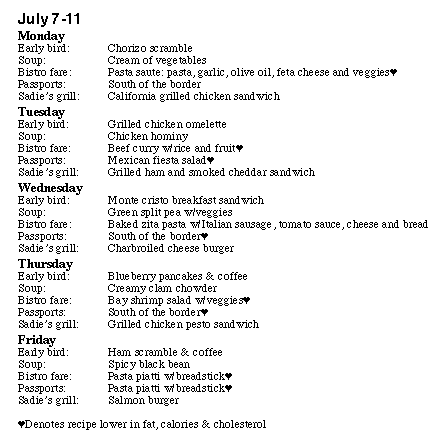

Please note also: